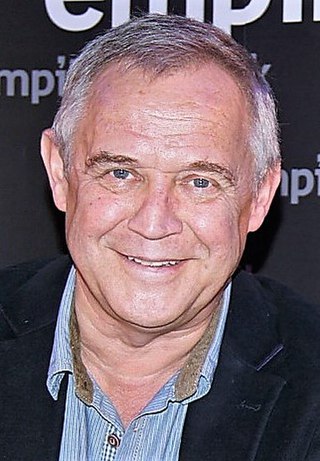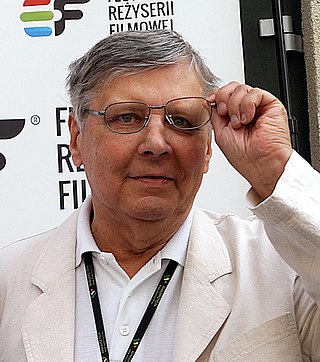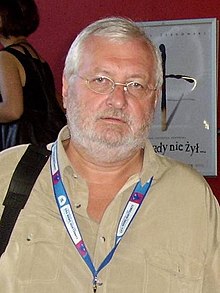
Janusz Gajos is a Polish film, television and theatre actor as well as pedagogue and photographer. Professor of Theatre Arts and an Honorary Doctor of the National Film School in Łódź, he is considered one of the greatest Polish actors.

Stanisław Dygat was a Polish writer. His most famous novel, "Jezioro Bodeńskie", was written during World War II and published in 1946. All of his works are partly autobiographical.

Feliks Żukowski was a Polish actor and theatre director. He worked in theatres in Warsaw, Vilnius, Lublin, Częstochowa and Łódź. Feliks was a manager of Stefan Jaracz Teatr in Olsztyn. He was also a soldier of Armia Krajowa, prisoner of Sachsenhausen concentration camp.

Front of National Unity or National Unity Front was a popular front supervising elections in the Polish People's Republic which also acted as a coalition for the dominant communist Polish United Workers' Party (PZPR) and its allies. It was founded in 1952 as National Front and renamed to Front of National Unity in 1956. It was the heir of the Democratic Bloc which ran in the elections of 1947 before the merger between communists and socialists.

Jerzy Zaruba (1891–1971) was a Polish graphic artist, stage scenographer and caricaturist; author of satirical drawings, political crèches and illustrations for books and magazines. Pupil of Stanisław Lentz. His work was part of the painting event in the art competition at the 1928 Summer Olympics.

Magdalena Zawadzka is a Polish stage and film actress. She is the wife of actor Gustaw Holoubek and the mother of cinematographer Jan Holoubek. She gained wide popularity after the 1968 film Colonel Wolodyjowski, in which she played the role of Basia Wołodyjowska.

Gustaw Teofil Holoubek was a Polish actor, director, member of the Polish Sejm, and a senator.

Marek Tadeusz Kondrat is a Polish film, television and theatre actor, film director, screenwriter and entrepreneur. He is regarded as one of the most popular and successful Polish actors of his generation. He gained nationwide recognition by starring in such films as Man of Iron (1981), C.K. Dezerterzy (1985), Pigs (1992), Colonel Kwiatkowski (1996), Sir Thaddeus (1999), Operacja Samum (1999) and Day of the Wacko (2002).

Jerzy Bińczycki was a Polish stage and film actor. He appeared in 50 films between 1962 and 1998. He starred in the 1975 film Nights and Days, which was entered into the 26th Berlin International Film Festival.

Henryk Bista was a Polish actor. He appeared in over 110 films between 1961 and 1997. He starred in the 1977 film Death of a President, which was entered into the 28th Berlin International Film Festival, where it won the Silver Bear for an outstanding artistic contribution. He was awarded many Polish film and state awards, including the Knight's Cross of the Order of Polonia Restituta (1984), the Gold and Silver Crosses of Merit and the Bronze Medal of Merit for National Defence (1968).

Olaf Sergiusz Linde-Lubaszenko is a Polish actor and film director.
Józef Razowski is a Polish entomologist and lepidopterist specializing in Tortricidae. He is an honorary member of the Polish Entomological Society and a working member of the Polish Academy of Arts and Sciences (PAU). From 1988 to 1997, Razowski headed the Institute of Systematics and Evolution of Animals.
Zespół Filmowy "X" is a Polish film production studio, inaugurated on New Year's Day, 1972. The studio's formation was the brainchild of acclaimed Polish director Andrzej Wajda, who served as the Artistic Director for the duration of the studio's existence.
Szczęśliwego Nowego Jorku is a 1997 Polish comedy film directed by Janusz Zaorski. It is a film about six Polish immigrants in New York City unsuccessfully trying to cope with the realities of New York.
Adam Iwiński was a Polish film director, cinematographer, and actor.

Andrzej Adam Zaorski was a Polish actor and cabaret artist, appearing in television, film and theater, as well as on the radio. He was the son of Tadeusz Zaorski, the brother of film director Janusz Zaorski, and the father-in-law of satyrist Andrzej Butruk.

Andrzej Tadeusz Szczepkowski was a Polish actor. He appeared in more than 30 films and television shows between 1957 and 1997.
Bogusław Sochnacki was a Polish actor. He appeared in more than 100 films and television shows between 1950 and 2003.

Union of Polish Stage Artists(Związek Artystów Scen Polskich ZASP – Stowarzyszenie) is a Polish union established 21 December 1918, during Constitutional Congress in Rozmaitości Theater in Warsaw. First chair was Józef Śliwicki. The statute of the Union was signed, among others, by: Stefan Jaracz, Juliusz Osterwa and Aleksander Zelwerowicz.














